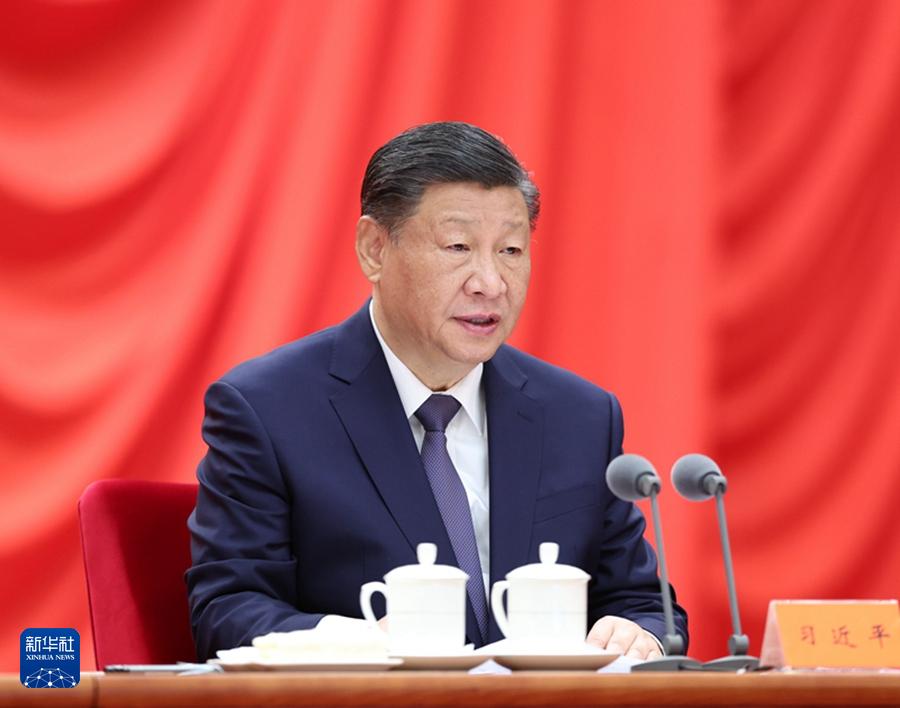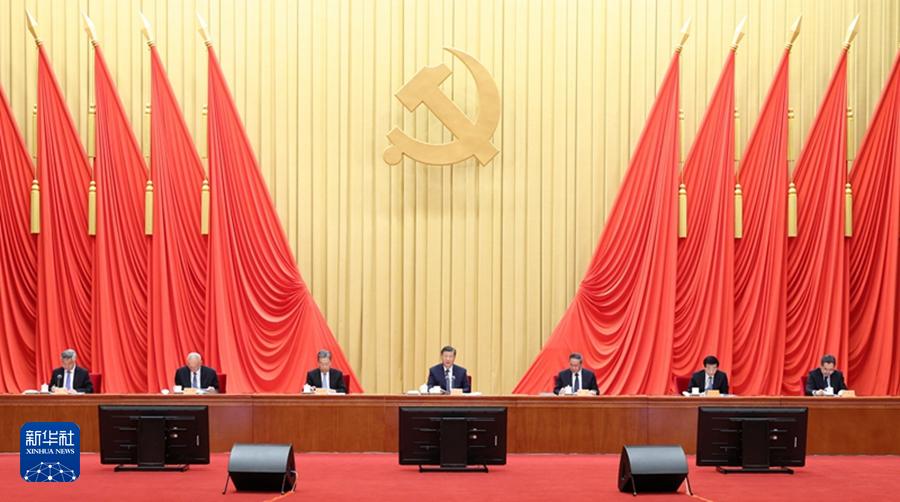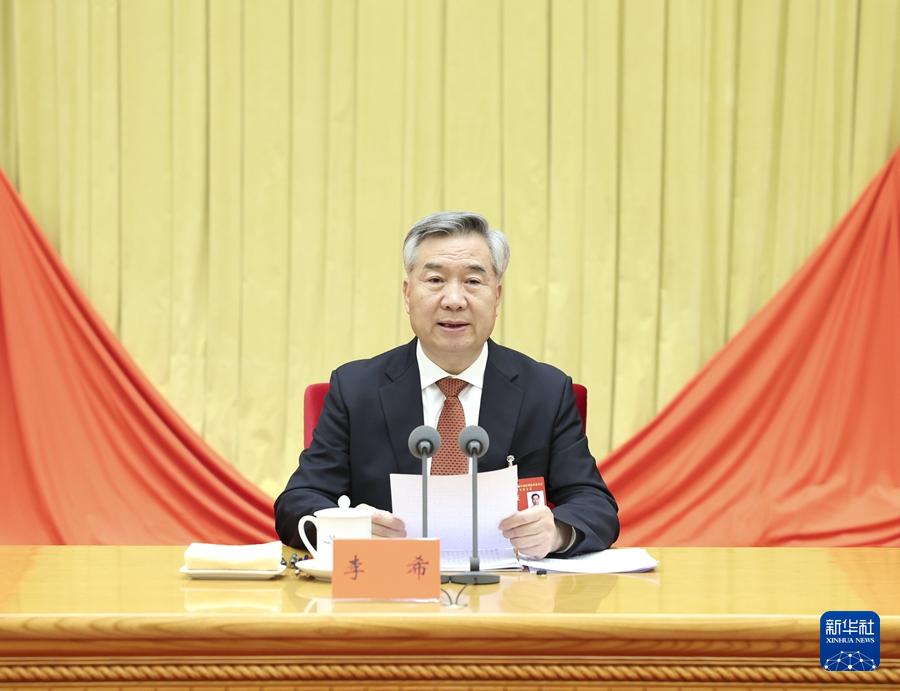We will stay firmly rooted in Chinese culture. We will collect and refine the defining symbols and best elements of Chinese culture and showcase them to the world. We will accelerate the development of China’s discourse and narrative systems, better tell China’s stories, make China’s voice heard, and present a China that is credible, appealing, and respectable.
習近平在二十屆中央紀委三次全會上發表重要講話強調 深入推進
黨的自我革命 堅決打贏反腐敗鬥爭攻堅戰持久戰
發佈時間:2024-01-09 09:09:40 | 來源:新華網 | 作者: | 責任編輯:張芃芃習近平在二十屆中央紀委三次全會上發表重要講話強調
深入推進黨的自我革命
堅決打贏反腐敗鬥爭攻堅戰持久戰
李強趙樂際王滬寧蔡奇丁薛祥出席會議
李希主持會議
新華社北京1月8日電 中共中央總書記、國家主席、中央軍委主席習近平8日上午在中國共産黨第二十屆中央紀律檢查委員會第三次全體會議上發表重要講話。他強調,經過新時代十年堅持不懈的強力反腐,反腐敗鬥爭取得壓倒性勝利並全面鞏固,但形勢依然嚴峻複雜。我們對反腐敗鬥爭的新情況新動向要有清醒認識,對腐敗問題産生的土壤和條件要有清醒認識,以永遠在路上的堅韌和執著,精準發力、持續發力,堅決打贏反腐敗鬥爭攻堅戰持久戰。

1月8日,中共中央總書記、國家主席、中央軍委主席習近平在中國共産黨第二十屆中央紀律檢查委員會第三次全體會議上發表重要講話。新華社記者 鞠鵬 攝
中共中央政治局常委李強、趙樂際、王滬寧、蔡奇、丁薛祥出席會議。中共中央政治局常委、中央紀律檢查委員會書記李希主持會議。

1月8日,中共中央總書記、國家主席、中央軍委主席習近平在中國共産黨第二十屆中央紀律檢查委員會第三次全體會議上發表重要講話。李強、趙樂際、王滬寧、蔡奇、丁薛祥、李希出席會議。新華社記者 龐興雷 攝
習近平指出,2023年是全面貫徹黨的二十大精神的開局之年。黨中央堅定不移推進黨的自我革命,在全黨深入開展學習貫徹新時代中國特色社會主義思想主題教育,堅持不懈用黨的創新理論凝心鑄魂,著力推進政治監督具體化、精準化、常態化,著力整治形式主義、官僚主義突出問題,堅決清除黨員、幹部隊伍中的害群之馬,從嚴從實加強對黨員、幹部的管理監督,推動全面從嚴治黨向縱深發展,推動黨的二十大決策部署不折不扣貫徹落實,有力引領保障新征程開局起步。
習近平強調,我們黨作為世界上最大的馬克思主義執政黨,如何成功跳出治亂興衰歷史週期率、確保黨永遠不變質不變色不變味?這是擺在全黨同志面前的一個戰略性問題。黨的十八大以來,在推進全面從嚴治黨的偉大實踐中,我們不斷進行實踐探索和理論思考,在毛澤東同志當年給出“讓人民來監督政府”的第一個答案基礎上,給出了第二個答案,那就是不斷推進黨的自我革命。在新時代十年全面從嚴治黨的實踐和理論探索中,我們不斷深化對黨的自我革命的認識,積累了豐富實踐經驗,形成了一系列重要理論成果,系統回答了我們黨為什麼要自我革命、為什麼能自我革命、怎樣推進自我革命等重大問題。
習近平指出,在深入推進黨的自我革命實踐中需要把握好九個問題,即:以堅持黨中央集中統一領導為根本保證,以引領偉大社會革命為根本目的,以新時代中國特色社會主義思想為根本遵循,以跳出歷史週期率為戰略目標,以解決大黨獨有難題為主攻方向,以健全全面從嚴治黨體系為有效途徑,以鍛造堅強組織、建設過硬隊伍為重要著力點,以正風肅紀反腐為重要抓手,以自我監督和人民監督相結合為強大動力。要堅持解放思想、實事求是、與時俱進、守正創新,不斷進行實踐探索和理論創新,不斷深化對黨的自我革命的規律性認識,把黨的自我革命的思路舉措搞得更加嚴密,把每條戰線、每個環節的自我革命抓具體、抓深入。
習近平強調,新征程反腐敗鬥爭,必須在剷除腐敗問題産生的土壤和條件上持續發力、縱深推進。總的要求是,堅持一體推進不敢腐、不能腐、不想腐,深化標本兼治、系統施治,不斷拓展反腐敗鬥爭深度廣度,對症下藥、精準施治、多措並舉,讓反覆發作的老問題逐漸減少,讓新出現的問題難以蔓延,推動防範和治理腐敗問題常態化、長效化。
習近平指出,要加強黨對反腐敗鬥爭的集中統一領導。各級黨委要切實強化對反腐敗鬥爭全過程領導,堅決支援查辦腐敗案件,動真碰硬抓好問題整改。紀委監委作為專責機關,要更加主動擔起責任,有力有效協助黨委組織協調反腐敗工作,整合反腐敗全鏈條力量。各職能部門要堅持高效協同,自覺把黨中央反腐敗的決策部署轉化為具體行動。
習近平強調,要持續保持懲治腐敗高壓態勢。面對依然嚴峻複雜的形勢,反腐敗絕對不能回頭、不能鬆懈、不能慈悲,必須永遠吹衝鋒號。要持續盯住“七個有之”問題,把嚴懲政商勾連的腐敗作為攻堅戰重中之重,堅決打擊以權力為依託的資本逐利行為,堅決防止各種利益集團、權勢團體向政治領域滲透。深化整治金融、國企、能源、醫藥和基建工程等權力集中、資金密集、資源富集領域的腐敗,清理風險隱患。懲治“蠅貪蟻腐”,讓群眾有更多獲得感。
習近平指出,要深化改革阻斷腐敗滋生蔓延。腐敗的本質是權力濫用。要抓住定政策、作決策、審批監管等關鍵權力,聚焦重點領域深化體制機制改革,加快新興領域治理機制建設,完善權力配置和運作制約機制,進一步堵塞制度漏洞,規範自由裁量權,減少設租尋租機會。要建立腐敗預警懲治聯動機制,加強廉潔風險隱患動態監測,強化對新型腐敗和隱性腐敗的快速處置。
習近平強調,要進一步健全反腐敗法規制度。圍繞一體推進不敢腐、不能腐、不想腐等完善基礎性法規制度,健全加強對“一把手”和領導班子監督配套制度。持續推進反腐敗國家立法,與時俱進修改監察法,以學習貫徹新修訂的紀律處分條例為契機,在全黨開展一次集中性紀律教育。加強重點法規制度執行情況監督檢查,確保一體遵循、一體執行。
習近平指出,要加大對行賄行為懲治力度。嚴肅查處那些老是拉幹部下水、危害一方的行賄人,通報典型案例,以正視聽、以儆效尤。加大對行賄所獲不正當利益的追繳和糾正力度。
習近平強調,要持之以恒凈化政治生態。堅持激濁和揚清並舉,嚴明政治紀律和政治規矩,嚴肅黨內政治生活,破“潛規則”,立“明規矩”,堅決防止搞“小圈子”、“拜碼頭”、“搭天線”,有力打擊各種政治騙子,嚴格防止把商品交換原則帶到黨內。堅持不懈整治選人用人上的不正之風,推動形成清清爽爽的同志關係、規規矩矩的上下級關係,促進政治生態山清水秀。
習近平指出,要加強新時代廉潔文化建設。深入開展黨性黨風黨紀教育,傳承黨的光榮傳統和優良作風,激發共産黨員崇高理想追求,把以權謀私、貪污腐敗看成是極大的恥辱。要注重家庭家教家風,督促領導幹部從嚴管好親屬子女。積極宣傳廉潔理念、廉潔典型,營造崇廉拒腐的良好風尚。
習近平強調,紀檢監察機關是推進黨的自我革命的重要力量,肩負特殊政治責任和光榮使命任務,必須始終做到絕對忠誠、絕對可靠、絕對純潔。要鞏固拓展教育整頓成果,進一步築牢政治忠誠,任何時候任何情況下都要同黨中央同心同德,把增強“四個意識”、堅定“四個自信”、做到“兩個維護”轉化成聽黨指揮、為黨盡責的實際行動。要堅持原則、勇於亮劍,敢鬥善鬥、擔當盡責,堅定不移正風肅紀反腐,推動全面從嚴治黨向縱深發展。要加強紀檢監察幹部隊伍建設,常態化清除害群之馬,堅決防治“燈下黑”,努力做自我革命的表率、遵規守紀的標桿,打造一支讓黨中央放心、讓人民群眾滿意的紀檢監察鐵軍。
李希在主持會議時指出,習近平總書記發表的重要講話,總結了全面從嚴治黨的新進展、新成效,深刻闡述黨的自我革命的重要思想,科學回答我們黨為什麼要自我革命、為什麼能自我革命、怎樣推進自我革命等重大問題,明確提出“九個以”的實踐要求,對持續發力、縱深推進反腐敗鬥爭作出戰略部署。講話高瞻遠矚、視野宏闊、思想深邃、內涵豐富,是新時代新征程深入推進全面從嚴治黨、黨風廉政建設和反腐敗鬥爭的根本遵循。要深入學習貫徹習近平總書記重要講話精神和習近平總書記關於黨的自我革命的重要思想,堅定擁護“兩個確立”、堅決做到“兩個維護”,縱深推進全面從嚴治黨、黨的自我革命,為以中國式現代化全面推進強國建設、民族復興偉業提供堅強保障。
中共中央政治局委員、中央書記處書記,全國人大常委會有關領導同志,國務委員,最高人民法院院長,最高人民檢察院檢察長,全國政協有關領導同志以及中央軍委委員出席會議。
中央紀律檢查委員會委員,中央和國家機關各部門、各人民團體主要負責同志,軍隊有關單位主要負責同志等參加會議。會議以電視電話會議形式舉行,各省、自治區、直轄市和新疆生産建設兵團以及軍隊有關單位設分會場。

1月8日,中國共産黨第二十屆中央紀律檢查委員會第三次全體會議在北京開幕。中共中央政治局常委、中央紀律檢查委員會書記李希代表中央紀律檢查委員會常務委員會作題為《深入學習貫徹習近平總書記關於黨的自我革命的重要思想,縱深推進新征程紀檢監察工作高品質發展》的工作報告。新華社記者 龐興雷 攝
中國共産黨第二十屆中央紀律檢查委員會第三次全體會議于1月8日在北京開幕。中央紀律檢查委員會常務委員會主持會議。8日下午李希代表中央紀律檢查委員會常務委員會作題為《深入學習貫徹習近平總書記關於黨的自我革命的重要思想,縱深推進新征程紀檢監察工作高品質發展》的工作報告。
Xi stresses winning tough, protracted battle against corruption
BEIJING, Jan. 8 (Xinhua) -- Xi Jinping, general secretary of the Communist Party of China (CPC) Central Committee, on Monday called for advancing the Party's self-reform and winning the tough and protracted battle against corruption.
Xi, also Chinese president and chairman of the Central Military Commission, made the remarks while addressing the third plenary session of the 20th CPC Central Commission for Discipline Inspection (CCDI).
After persistent anti-corruption efforts over the past 10 years of the new era, an overwhelming victory has been achieved in the fight against corruption, with the gains fully consolidated, Xi said.
"But the situation remains grave and complex," Xi noted.
"We should be fully aware of new development in the fight against corruption and the breeding grounds and conditions for corruption," Xi said, urging more efforts to win the tough and protracted battle.
Members of the Standing Committee of the Political Bureau of the CPC Central Committee Li Qiang, Zhao Leji, Wang Huning, Cai Qi and Ding Xuexiang attended the meeting.
Li Xi, a member of the Standing Committee of the Political Bureau of the CPC Central Committee and secretary of the CCDI, presided over the meeting.
Xi noted that 2023 marks the first year that the guiding principles of the 20th CPC National Congress are implemented on all fronts.
The CPC Central Committee has unswervingly advanced the Party's self-reform and deepened its efforts to promote full and rigorous Party self-governance, which has guaranteed that the new journey gets off to a good start, he said.
As the world's largest Marxist governing party, the CPC faces the strategic question of how to escape the historical cycle of rise and fall, and how the Party can remain steadfast in its commitment to never change its nature, its conviction, or its character, he said.
Since the 18th CPC National Congress in 2012, in its great endeavor of promoting full and rigorous Party self-governance, the CPC has, based on Comrade Mao Zedong's first answer of "putting the government under the supervision of the people," found a second answer to the question -- advancing the Party's self-reform, he noted.
Over the past 10 years, through the practice and theoretical exploration of exercising full and rigorous Party self-governance, a series of important theoretical results have been accomplished, Xi said, adding that these results theoretically answer the major questions including why the CPC should carry out self-reform, why it is capable of self-reform, and how it can promote self-reform.
Xi pointed out nine important issues to advance the Party's self-reform:
-- the fundamental guarantee is to uphold the centralized, unified leadership of the CPC Central Committee;
-- the fundamental purpose is to guide the great social revolution;
-- the fundamental guidance stands as the Thought on Socialism with Chinese Characteristics for a New Era;
-- the strategic target is to break the historical cycle of rise and fall;
-- the main direction is to tackle the special challenges that a large party like the CPC faces;
-- the effective method is to improve the systems for exercising full and rigorous self-governance;
-- the focus is to forge strong Party organizations and cultivate highly-committed Party members;
-- the key task is to improve Party conduct, enforce Party discipline and fight corruption;
-- the strong impetus is from the integration of self-regulation and oversight from the people.
Xi stressed that, in order to advance the anti-corruption campaign in the new era, continuous efforts should be made to eliminate the breeding grounds and conditions for corruption.
He called for coordinated actions to ensure that officials do not have the audacity, opportunity or desire to become corrupt, as well as persistent efforts to expand the scale and extent of anti-corruption campaigns, and regular and long-term measures to prevent and curb corruption.
Xi underlined the importance of enhancing the Party's centralized, unified leadership in the fight against corruption.
He also stressed the importance of maintaining a tough stance against corruption and said that in the continued grave and complex situation, there is no possibility of stopping, slackening or compromising the anti-corruption campaign.
Combating corruption in the form of collusion between officials and businesspeople should be the priority, Xi said, urging efforts to crack down resolutely on the profit-driven abuse of power and prevent various interest and power groups from infiltrating the political arena.
Xi called for greater efforts to rectify corruption in the finance, state-owned enterprise, energy, medicine and infrastructure project sectors, as well as efforts to punish graft occurring on people's doorsteps.
Deepening reform is necessary to stem the spread of corruption, Xi noted, calling for an integrated early warning and punishment mechanism, and for the strengthened handling of new and disguised forms of corruption.
Underscoring the need to improve the legal system that fights corruption, Xi said national anti-graft legislation should be promoted continuously, and the Supervision Law should be amended in pace with the times. He also called for an education campaign on discipline within the Party.
Xi urged redoubled efforts to tackle and punish acts of bribery, and efforts to retrieve and address the illicit interests gained by those who give bribes.
He urged constant and rigorous efforts to purify the political eco-system, prevent the rules of business dealings from entering into the Party, and persistently rectify misconduct in the selection and appointment of officials.
Efforts should be made to promote a culture of integrity in the new era, carry forward the proud traditions and venerable conduct of the Party, and ignite Party members' lofty ideals and pursuits, Xi noted.
Stressing the importance of fostering strengthened familial ties, values and traditions, Xi urged efforts to ensure leading officials establish good discipline values among their families and relatives.
Noting that discipline inspection and supervision agencies are important forces driving the Party's self-reform, Xi said that these agencies should be loyal, reliable and pure in an absolute manner.
Xi ordered efforts to build a strengthened contingent of disciplinary inspection and supervision cadres, as well as efforts to forge them into an "iron army" that the Party can trust and that can meet the people's expectations.
While presiding over the plenary session, Li Xi said that Xi's speech made strategic plans for the advancement of the fight against corruption, calling for the thorough study and implementation of the spirit of the speech, as well as Xi's important ideas for the Party's self-reform.
Li urged efforts to advance full and rigorous Party self-governance and self-reform to provide a strong guarantee for building a strong country and realizing national rejuvenation on all fronts through a Chinese path to modernization.
The third plenary session of the 20th CPC CCDI opened on Monday. Li delivered a work report on behalf of the CCDI standing committee on Monday afternoon.■

